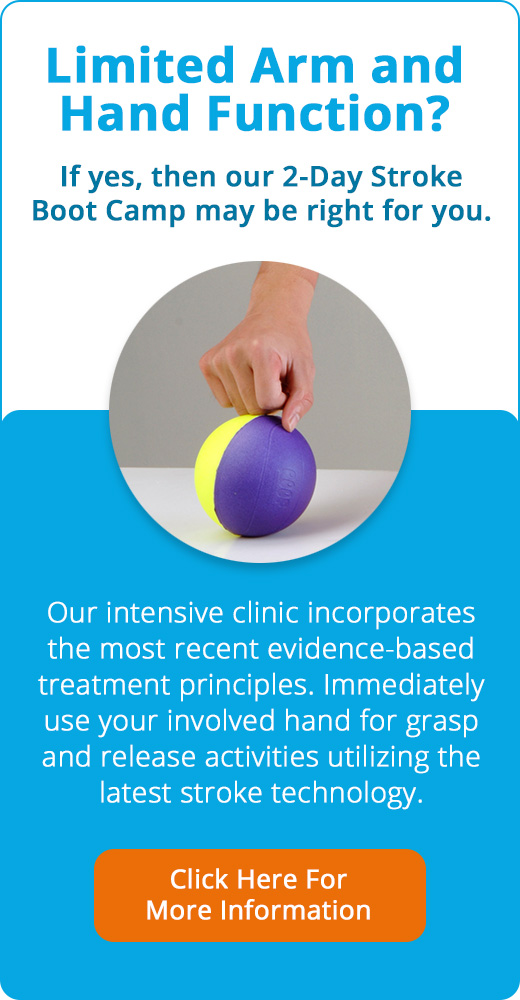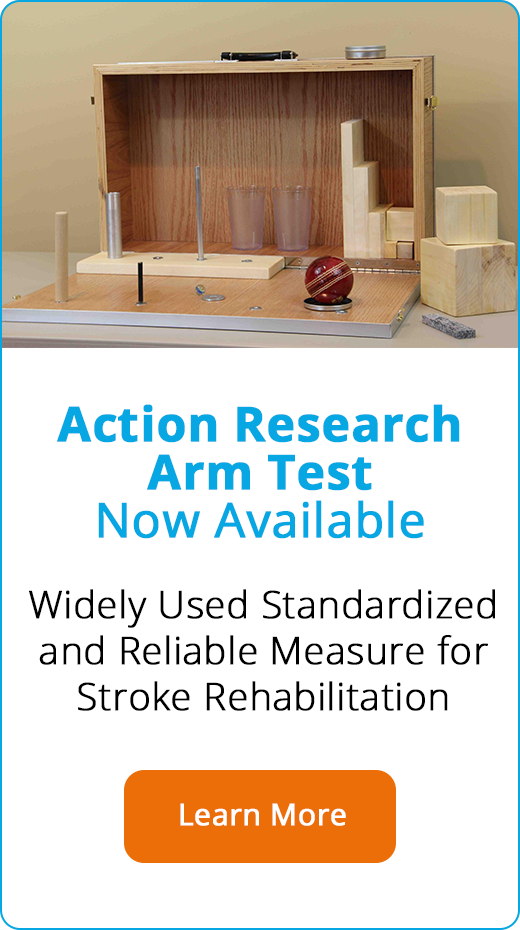Stroke Rehab Exercise Equipment. Where do I Start?
NeuroRehab Team
Monday, March 28th, 2016

As if learning to adjust to a new life following a stroke or neurological injury is not difficult enough, finding a home exercise program and appropriate stroke/neuro therapy equipment can be equally daunting. Assuming a therapist is up-to-date with current stroke research and latest technology available (could be a big assumption), there is a good chance that he or she will recommend exercises and products that will be meaningful to the client.
For many clients, they are not so lucky and are forced to go online and aimlessly begin searching for “stroke exercises” or “stroke rehab equipment” in hopes of finding the perfect program or therapy device. In this example, the client is typically no longer communicating with his or her therapist and must now rely on product manufacturers websites and biased sponsored advertisements as their trusted source for information.
New 2-Day “Stroke Therapy Book Camp” Now Available For Patients
To soften the burden on the patients and families, www.neurorehabdirectory.com has created a comprehensive easy-to-use website to search for life-changing stroke/neuro resources in a non-biased way.
Is this product right for me? How much does it cost? What are the reviews?
Every individual suffering from a disability deserves the right to know the answers to these simple questions. Many of us research online before purchasing everyday items like appliances or electronics, so why not provide this same level of scrutiny when it comes to one’s own recovery?
Get Started
Listed below are various clinical product categories that you may have learned while in therapy. Feel free to click on any category to see a list of products that may be appropriate for your needs. Also, have you used a product that has changed your life? How about a treatment solution that was not as beneficial as you hoped? Find products that you have used and share your honest feedback. To keep product companies honest, we collect reviews from actual users so individuals can make the best decision based on real feedback.
Arm Bike
An Arm Bike is a stationary cycle designed to strengthen and condition the upper body, as well as the cardiovascular system, by using the arms.
Biofeedback
Biofeedback or electromyography (EMG) is a non-invasive technique used for measuring muscle electrical activity that occurs during muscle contraction and relaxation.
Body Weight Support
Body Weight Support uses a suspension system and a harness to support a percentage of the user’s body weight during standing, walking or exercise.
Find Body Weight Support Devices
Cognitive-Communication Training
Cognitive-Communication Training consists of specialized hardware devices and/or software programs used in therapy or at home as a way to improve cognition and/or communication skills.
Find Cognitive-Communication Devices
Edema Management
Edema is a medical term for swelling caused by excess fluid trapped in the body’s tissues (i.e., hand/foot). One of the common treatment techniques used to reduce edema is a compression garment. Examples of garments include gloves, elastic stockings, and ace wraps.
Find Edema Management Products
Electrical Stimulation
Electrical stimulation or neuromuscular electrical stimulation (NMES) is a technique used to elicit a muscle contraction using electrical impulses. Electrical current is then sent from the unit to the electrodes and delivered into the muscle causing a contraction.
Find Electrical Stimulation Devices
EMG-Triggered Stimulation
EMG-Triggered Stimulation is based on the user’s voluntary movement, or intent to move. Electrodes, controlled by a unit, are placed on the skin over a specific area. Once the user attempts to contract his or her muscles and reaches the prescribed threshold, stimulation is triggered (delivered) to the same muscles. Various visual and auditory feedback options monitor the progress.
Find EMG-Triggered Stim Devices
Exercise Aid
An Exercise Aid is a piece of equipment used during physical activity to improve strength and coordination of the body region targeted.
Foot Drop Brace
A Foot Drop Brace is a rigid or flexible support that offers dynamic or static assistance to the weakened foot so functional mobility and exercises can be possible.
Hand Function Splint
A Hand Function Splint is a rigid or flexible brace that offers dynamic or static assistance to the weakened hand so functional activities and exercises can be possible.
Leg Bike
A Leg Bike is a stationary cycle designed to strengthen and condition the lower body, as well as the cardiovascular system, by using the legs.
Lower Limb Robot-Assisted Therapy
Lower Limb Robot-Assisted Therapy consists of an electromechanical device, designed for the leg, that is used to assist users (through powered mobility) with exercise training and activities of daily living (ADL).
Find Lower Limb Robot-Assisted Therapy
Mirror Therapy
In Mirror Therapy, a mirror is placed beside the unaffected limb, blocking the view of the affected limb. This creates the illusion that both limbs are functioning properly. Damaged areas of the brain’s motor cortex may improve by viewing movements of intact, functioning limbs.
Mobile Arm Support
A Mobile Arm Support (MAS) is a gravity supported mechanical device mounted on wheelchairs, tables, or base frames. A MAS is used to support the weak arm to improve motor function and strength. In addition, the device allows patients with shoulder weakness to perform self care tasks such as feeding, hygiene, grooming, and writing.
Motorized Arm and Leg Bike
A Motorized Arm and Leg Bike is a motor-assisted cycle designed to strengthen and condition the upper body and lower body, as well as the cardiovascular system, by only using the arms and/or legs.
Find Motorized Arm and Leg Bikes
Shoulder Subluxation Sling
A Subluxation Sling is typically used on hemiparetic arms that are flaccid or exhibit minimal to no movement. They offer support, protection against injury and can prevent or reduce shoulder pain.
Find Shoulder Subluxation Slings
Upper Limb Contracture Splint
A Upper Limb Contracture Splint is a brace used to prevent or treat contractures. The goal of a contracture splint is to help keep the soft tissues (muscle and tendons) in the arm and hand stretched properly.
Find Upper Limb Contracture Splints
Upper Limb Robot-Assisted Therapy
Upper Limb Robot-Assisted Therapy consists of an electromechanical device, designed for the arm or hand, that is used to assist users (through powered mobility) with exercise training and activities of daily living (ADL).
Find Upper Limb Robot-Assisted Therapy
Virtual Reality/Exercise Games
Virtual Reality/Exercise Games consists of computer-based, interactive exercise games and activities that allow players to engage in entertaining tasks while being physically challenged. These games rely on technology that tracks body movements or reactions. Some advanced games allow users to set goals, grade and customize, receive instantaneous feedback, reinforce behaviors, and record and analyze results.
Find Virtual Reality/Exercise Gaming Devices
Visual Motor Training
Visual Motor Training consists of coordinating visual skills together with gross-motor and/or fine-motor movement. It is the ability to integrate visual input with physical output. This is how individuals plan, execute and monitor functional tasks, such as turning a page, buttoning a shirt, or walking safely.
Find Visual Motor Training Devices

